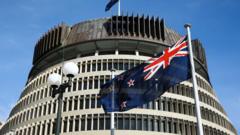In a notable statement concerning the cultural significance of language, Speaker Gerry Brownlee of New Zealand's Parliament has stressed that he will no longer entertain complaints regarding the use of the country's Māori name, Aotearoa. This assertion comes after Deputy Prime Minister Winston Peters argued for a prohibition on Aotearoa's use in Parliament, suggesting that a public referendum would be necessary to sanction its adoption. While New Zealand remains the legal title of the country—alterable only by legislative action—Aotearoa, which translates to "land of the long white cloud," holds cultural importance and a long history in Māori communities.
"The name Aotearoa is viewed as part of our identity and is inscribed on passports and currency," Brownlee stated in Parliament on Tuesday. His remarks follow a parliamentary incident involving Green MP Ricardo Menéndez March, who had referenced Aotearoa during his speech, prompting Peters' controversial objections. Menéndez March, originally from Mexico, argued that his citizenship grants him the same parliamentary rights as Peters, who questioned his authority to influence the country’s nomenclature.
Brownlee encouraged MPs to consider using "Aotearoa New Zealand" to circumvent misunderstandings but affirmed that no member is obligated to follow this advice. His ruling highlights the allowance for lawmakers to communicate in any of New Zealand's three official languages: English, Māori, and New Zealand Sign Language.
Debate continues surrounding Aotearoa’s relevance, especially as some Māori feel the term should remain tied solely to the North Island. Peters clarified that his issue lies with the name's parliamentary usage, turning down any future questions posed under the term. The acceptance of Māori in public life has seen significant growth in recent years, largely as a result of indigenous advocacy efforts. In 2022, a campaign led by the Māori Party to rename the nation Aotearoa gathered over 70,000 signatures, emphasizing the disconnect of the term "New Zealand," which has Dutch origins.
Compounding this linguistic contention is the current government policy mandating that state departments prioritize English communication unless specifically addressing Māori matters. With further legislative intentions to review the foundational Treaty of Waitangi, tensions surrounding Māori representation and identity continue to unfold in the nation's political landscape.



















